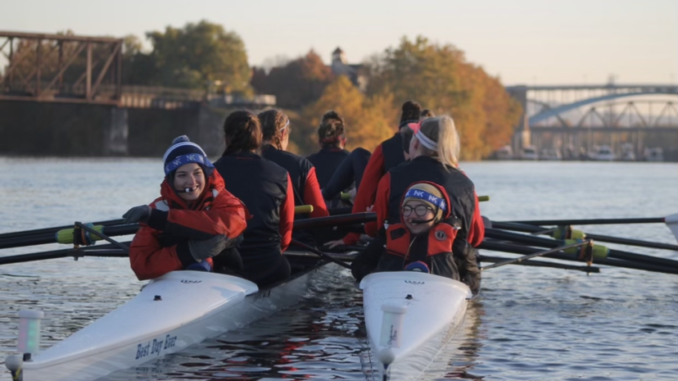
Zach Petroff | Opinions Editor
March 23, 2023
It is 27 degrees at 5:25 a.m. on Monday. Despite the recent daylight savings time shift, the sun has yet to make its appearance across the horizon. The intensity of the wind increases closer to the river.
While most of the world is still sound asleep, the 50 women that make up Duquesne’s rowing team have been awake and bearing the cold for over half an hour.
Among the athletes is senior Elizabeth Kuhn, a nursing student with a specific and lofty goal.
“I’ve been saying this since freshman year,” Kuhn said. “I want an [Atlantic 10 Conference] medal and I keep pushing for it. I’ve never once given less.”
That’s a tall task for a team that placed near the bottom of the A-10 last year and faces steep competition for this upcoming season.
Yet, given Kuhn’s relentless strive for excellence, and seeing her interact with her teammates, it’s hard not to believe that she could accomplish that goal.
While there are many student-athletes on campus, Kuhn’s workload is unrivaled by many of her peers. Often beginning her mornings around 4:30 a.m., she finds her day filled with not only rowing, but the coursework of a nursing student, clinicals, an internship and a part-time job at a hospital. She also maintains a 3.8 grade point average.
“My Monday, Wednesdays kill me because I don’t go home until 6 p.m.,” Kuhn said. “Tuesday and Thursdays I get to go home, eat breakfast at home and then go to clinicals.”
The Duquesne School of Nursing is demanding. Students are advised to put in two hours of study time for every credit hour they take. Students are also required to maintain at least a 78% in all of their nursing classes.
“We are looking for those well-rounded, dedicated, really kind of conscientious-style students who know that it’s going to be difficult, but don’t shy away from the challenge,” said clinical assistant professor Cara Morrill-Stoklosa. “They know what they’re getting into, and they are ready to face that head on.”
While this is Kuhn’s first year as a captain, she has always assumed a leadership role as the coxswain.
“Coxswains are meant to be somewhat of a coach inside the boat, and are to help the rowers perfect the complex stroke in real time,” said graduate assistant coach Osa Wheeler. “Liz does very well at having a keen eye on the finite, technical aspects of rowing. She also wants the team to perform at the highest level, continually working to progress the team’s competitive edge.”
Kuhn’s natural leadership qualities seem to be driven by her compassion. The daughter of a salesman and baker-turned-kindergarten-teacher, she will be the first health care worker in the family.
Kuhn credits her family for her strong work ethic.
“Honestly, I don’t think I’ve ever not seen my dad working,” Kuhn said. “He didn’t come from much, and he wanted to turn his life into something.”
The women in her family also had a profound impact.
“My grandma was the first woman in her family to go to college, and then my mom opened up her own bakery,” Kuhn said. “They are all a huge part of my life.”
Originally wanting to become a biomedical engineer, Kuhn had a change of heart when she started volunteering and taking care of her grandfather.
“My grandpa got sick, and I took care of him for six years with my mom and grandma at home before he went into a nursing home,” Kuhn said. “I think taking care of him really propelled me toward nursing.”
When her grandfather was in the nursing home, Kuhn grew close with three of his nurses and cemented her plans to pursue a nursing career.
Giving back has always been an integral part of Kuhn’s life.
“I did a lot more volunteering than I did science work in high school,” Kuhn said.
She has volunteered at a domestic and substance abuse shelter in Erie, Pa. She also started a toy drive for the Mercy Center for Women (in Erie) that still happens each year.
While Kuhn is clearly passionate about helping others, she is also a competitive person driven to succeed. During her free time, she likes to train for marathons and half-marathons. She has figured out a way to study while training.
“I would write out a study guide, record myself saying the study guide and then listen to it while I was running,” Kuhn said.
She would listen to them during her runs, which range anywhere between six and 18 miles.
Leading by example is an important part of Kuhn’s leadership style. Her role as a coxswain requires less athletic output and much more of a mental strain. Her willingness to “buy-in” to the program reverberates among the team as she takes a steady hand approach, even when things on the water can be chaotic.
“Liz is very good at going with the flow,” said Head Coach Matt Carlsen. “We’ll have a set plan, and I will blow it up and change it, and she keeps everybody else calm.”

